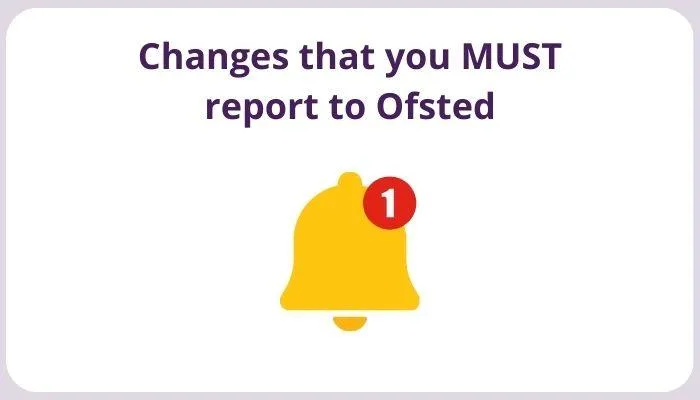Every child's well-being matters.
Well-being Articles

Changes That Must Be Notified to Ofsted
Ofsted plays a crucial role in ensuring early years settings maintain high standards of care and safeguarding for children. As part of your legal responsibilities, nursery and preschool leaders must notify Ofsted of certain changes that could impact the quality of care or the safety of children. Failing to report key changes can result in compliance action, fines, or even the suspension of your provision’s registration.
Understanding what must be reported and why is essential for safeguarding children and maintaining compliance. This article explores how early years leaders can improve their knowledge of notification requirements and embed good practice into their settings.
What Changes Must Be Notified to Ofsted?
Early years providers must inform Ofsted of any significant changes that could affect the safety, well-being, or overall management of a setting. These include:
Changes to leadership and management
Appointment of a new manager or nominated individual
Changes in ownership or governance
Significant changes in staff that could impact safeguarding
Concerns about a child’s safety
Any serious safeguarding incidents
Allegations of abuse or misconduct against staff members
Any serious injury, accident, or death of a child in the setting
Changes to the premises
Relocating the setting to new premises
Structural changes that could impact the suitability of the environment
Any major issues affecting safety, such as fire or flood damage
Changes in policies or procedures
A change in the safeguarding lead or key safeguarding procedures
Adjustments to how the setting manages health and safety risks
Being proactive about notifying Ofsted ensures that safeguarding standards remain high and that your setting operates in line with legal requirements.
How You Can Improve Your Understanding
1. Stay Updated with Ofsted Guidance
Ofsted’s Early Years and Childcare Registration Handbook outlines the specific changes that must be reported. Leaders should:
Regularly review the handbook and any updates from Ofsted
Subscribe to Ofsted alerts and sector news to stay informed
Attend webinars or training sessions on regulatory compliance
2. Embed a Culture of Compliance and Safeguarding
Effective safeguarding requires a strong compliance culture within the setting. Leaders should:
Ensure all staff understand their role in reporting safeguarding concerns
Regularly review policies and procedures with the team
Maintain clear records of incidents, policy changes, and staff training
3. Train Staff on Reporting Responsibilities
Leaders must ensure that all team members are confident in identifying and reporting issues that could require an Ofsted notification. This includes:
Holding regular training sessions on safeguarding and regulatory requirements
Providing clear guidelines on when and how to report changes
Encouraging open communication to ensure no concerns go unreported
4. Conduct Regular Compliance Audits
Carrying out internal audits can help identify any gaps in reporting and compliance. This should include:
Checking whether all past changes have been correctly reported
Reviewing safeguarding policies to ensure they align with Ofsted’s expectations
Keeping detailed records of incidents, management changes, and staff training
For Safeguarding Specifically
Failing to notify Ofsted about relevant changes can lead to safeguarding risks. If leadership changes go unreported, a setting may be run by individuals who have not been appropriately vetted. If serious safeguarding incidents are not disclosed, children may be left at risk, and staff accountability may be compromised.
By improving your understanding of Ofsted notification requirements, you can ensure that your setting remains safe, well-regulated, and compliant with safeguarding standards.
AUTHOR:- Iona has nearly 10 years of experience supporting nurseries and childminders in curriculum planning, leadership, and safeguarding. Her writing is informed by public information and sector insight, aiming to provide accessible, practical support for professionals working with children. She is part of the On the Button team, helping deliver Well-being, Safeguarding and Complaint Management Software that empowers practitioners to identify concerns early and act confidently.
On the Button provides innovative software tailored to the needs of the early years sector, with a strong focus on EYFS well-being and early years safeguarding. Our tools help senior practitioners to confidently track concerns, maintain robust records, and respond effectively — all while meeting statutory guidance. From early years complaint management to team-wide safeguarding alerts, our platform puts children's safety and emotional health first.

Changes That Must Be Notified to Ofsted
Ofsted plays a crucial role in ensuring early years settings maintain high standards of care and safeguarding for children. As part of your legal responsibilities, nursery and preschool leaders must notify Ofsted of certain changes that could impact the quality of care or the safety of children. Failing to report key changes can result in compliance action, fines, or even the suspension of your provision’s registration.
Understanding what must be reported and why is essential for safeguarding children and maintaining compliance. This article explores how early years leaders can improve their knowledge of notification requirements and embed good practice into their settings.
What Changes Must Be Notified to Ofsted?
Early years providers must inform Ofsted of any significant changes that could affect the safety, well-being, or overall management of a setting. These include:
Changes to leadership and management
Appointment of a new manager or nominated individual
Changes in ownership or governance
Significant changes in staff that could impact safeguarding
Concerns about a child’s safety
Any serious safeguarding incidents
Allegations of abuse or misconduct against staff members
Any serious injury, accident, or death of a child in the setting
Changes to the premises
Relocating the setting to new premises
Structural changes that could impact the suitability of the environment
Any major issues affecting safety, such as fire or flood damage
Changes in policies or procedures
A change in the safeguarding lead or key safeguarding procedures
Adjustments to how the setting manages health and safety risks
Being proactive about notifying Ofsted ensures that safeguarding standards remain high and that your setting operates in line with legal requirements.
How You Can Improve Your Understanding
1. Stay Updated with Ofsted Guidance
Ofsted’s Early Years and Childcare Registration Handbook outlines the specific changes that must be reported. Leaders should:
Regularly review the handbook and any updates from Ofsted
Subscribe to Ofsted alerts and sector news to stay informed
Attend webinars or training sessions on regulatory compliance
2. Embed a Culture of Compliance and Safeguarding
Effective safeguarding requires a strong compliance culture within the setting. Leaders should:
Ensure all staff understand their role in reporting safeguarding concerns
Regularly review policies and procedures with the team
Maintain clear records of incidents, policy changes, and staff training
3. Train Staff on Reporting Responsibilities
Leaders must ensure that all team members are confident in identifying and reporting issues that could require an Ofsted notification. This includes:
Holding regular training sessions on safeguarding and regulatory requirements
Providing clear guidelines on when and how to report changes
Encouraging open communication to ensure no concerns go unreported
4. Conduct Regular Compliance Audits
Carrying out internal audits can help identify any gaps in reporting and compliance. This should include:
Checking whether all past changes have been correctly reported
Reviewing safeguarding policies to ensure they align with Ofsted’s expectations
Keeping detailed records of incidents, management changes, and staff training
For Safeguarding Specifically
Failing to notify Ofsted about relevant changes can lead to safeguarding risks. If leadership changes go unreported, a setting may be run by individuals who have not been appropriately vetted. If serious safeguarding incidents are not disclosed, children may be left at risk, and staff accountability may be compromised.
By improving your understanding of Ofsted notification requirements, you can ensure that your setting remains safe, well-regulated, and compliant with safeguarding standards.
AUTHOR:- Iona has nearly 10 years of experience supporting nurseries and childminders in curriculum planning, leadership, and safeguarding. Her writing is informed by public information and sector insight, aiming to provide accessible, practical support for professionals working with children. She is part of the On the Button team, helping deliver Well-being, Safeguarding and Complaint Management Software that empowers practitioners to identify concerns early and act confidently.
On the Button provides innovative software tailored to the needs of the early years sector, with a strong focus on EYFS well-being and early years safeguarding. Our tools help senior practitioners to confidently track concerns, maintain robust records, and respond effectively — all while meeting statutory guidance. From early years complaint management to team-wide safeguarding alerts, our platform puts children's safety and emotional health first.

Changes That Must Be Notified to Ofsted
Ofsted plays a crucial role in ensuring early years settings maintain high standards of care and safeguarding for children. As part of your legal responsibilities, nursery and preschool leaders must notify Ofsted of certain changes that could impact the quality of care or the safety of children. Failing to report key changes can result in compliance action, fines, or even the suspension of your provision’s registration.
Understanding what must be reported and why is essential for safeguarding children and maintaining compliance. This article explores how early years leaders can improve their knowledge of notification requirements and embed good practice into their settings.
What Changes Must Be Notified to Ofsted?
Early years providers must inform Ofsted of any significant changes that could affect the safety, well-being, or overall management of a setting. These include:
Changes to leadership and management
Appointment of a new manager or nominated individual
Changes in ownership or governance
Significant changes in staff that could impact safeguarding
Concerns about a child’s safety
Any serious safeguarding incidents
Allegations of abuse or misconduct against staff members
Any serious injury, accident, or death of a child in the setting
Changes to the premises
Relocating the setting to new premises
Structural changes that could impact the suitability of the environment
Any major issues affecting safety, such as fire or flood damage
Changes in policies or procedures
A change in the safeguarding lead or key safeguarding procedures
Adjustments to how the setting manages health and safety risks
Being proactive about notifying Ofsted ensures that safeguarding standards remain high and that your setting operates in line with legal requirements.
How You Can Improve Your Understanding
1. Stay Updated with Ofsted Guidance
Ofsted’s Early Years and Childcare Registration Handbook outlines the specific changes that must be reported. Leaders should:
Regularly review the handbook and any updates from Ofsted
Subscribe to Ofsted alerts and sector news to stay informed
Attend webinars or training sessions on regulatory compliance
2. Embed a Culture of Compliance and Safeguarding
Effective safeguarding requires a strong compliance culture within the setting. Leaders should:
Ensure all staff understand their role in reporting safeguarding concerns
Regularly review policies and procedures with the team
Maintain clear records of incidents, policy changes, and staff training
3. Train Staff on Reporting Responsibilities
Leaders must ensure that all team members are confident in identifying and reporting issues that could require an Ofsted notification. This includes:
Holding regular training sessions on safeguarding and regulatory requirements
Providing clear guidelines on when and how to report changes
Encouraging open communication to ensure no concerns go unreported
4. Conduct Regular Compliance Audits
Carrying out internal audits can help identify any gaps in reporting and compliance. This should include:
Checking whether all past changes have been correctly reported
Reviewing safeguarding policies to ensure they align with Ofsted’s expectations
Keeping detailed records of incidents, management changes, and staff training
For Safeguarding Specifically
Failing to notify Ofsted about relevant changes can lead to safeguarding risks. If leadership changes go unreported, a setting may be run by individuals who have not been appropriately vetted. If serious safeguarding incidents are not disclosed, children may be left at risk, and staff accountability may be compromised.
By improving your understanding of Ofsted notification requirements, you can ensure that your setting remains safe, well-regulated, and compliant with safeguarding standards.
AUTHOR:- Iona has nearly 10 years of experience supporting nurseries and childminders in curriculum planning, leadership, and safeguarding. Her writing is informed by public information and sector insight, aiming to provide accessible, practical support for professionals working with children. She is part of the On the Button team, helping deliver Well-being, Safeguarding and Complaint Management Software that empowers practitioners to identify concerns early and act confidently.
On the Button provides innovative software tailored to the needs of the early years sector, with a strong focus on EYFS well-being and early years safeguarding. Our tools help senior practitioners to confidently track concerns, maintain robust records, and respond effectively — all while meeting statutory guidance. From early years complaint management to team-wide safeguarding alerts, our platform puts children's safety and emotional health first.

Changes That Must Be Notified to Ofsted
Ofsted plays a crucial role in ensuring early years settings maintain high standards of care and safeguarding for children. As part of your legal responsibilities, nursery and preschool leaders must notify Ofsted of certain changes that could impact the quality of care or the safety of children. Failing to report key changes can result in compliance action, fines, or even the suspension of your provision’s registration.
Understanding what must be reported and why is essential for safeguarding children and maintaining compliance. This article explores how early years leaders can improve their knowledge of notification requirements and embed good practice into their settings.
What Changes Must Be Notified to Ofsted?
Early years providers must inform Ofsted of any significant changes that could affect the safety, well-being, or overall management of a setting. These include:
Changes to leadership and management
Appointment of a new manager or nominated individual
Changes in ownership or governance
Significant changes in staff that could impact safeguarding
Concerns about a child’s safety
Any serious safeguarding incidents
Allegations of abuse or misconduct against staff members
Any serious injury, accident, or death of a child in the setting
Changes to the premises
Relocating the setting to new premises
Structural changes that could impact the suitability of the environment
Any major issues affecting safety, such as fire or flood damage
Changes in policies or procedures
A change in the safeguarding lead or key safeguarding procedures
Adjustments to how the setting manages health and safety risks
Being proactive about notifying Ofsted ensures that safeguarding standards remain high and that your setting operates in line with legal requirements.
How You Can Improve Your Understanding
1. Stay Updated with Ofsted Guidance
Ofsted’s Early Years and Childcare Registration Handbook outlines the specific changes that must be reported. Leaders should:
Regularly review the handbook and any updates from Ofsted
Subscribe to Ofsted alerts and sector news to stay informed
Attend webinars or training sessions on regulatory compliance
2. Embed a Culture of Compliance and Safeguarding
Effective safeguarding requires a strong compliance culture within the setting. Leaders should:
Ensure all staff understand their role in reporting safeguarding concerns
Regularly review policies and procedures with the team
Maintain clear records of incidents, policy changes, and staff training
3. Train Staff on Reporting Responsibilities
Leaders must ensure that all team members are confident in identifying and reporting issues that could require an Ofsted notification. This includes:
Holding regular training sessions on safeguarding and regulatory requirements
Providing clear guidelines on when and how to report changes
Encouraging open communication to ensure no concerns go unreported
4. Conduct Regular Compliance Audits
Carrying out internal audits can help identify any gaps in reporting and compliance. This should include:
Checking whether all past changes have been correctly reported
Reviewing safeguarding policies to ensure they align with Ofsted’s expectations
Keeping detailed records of incidents, management changes, and staff training
For Safeguarding Specifically
Failing to notify Ofsted about relevant changes can lead to safeguarding risks. If leadership changes go unreported, a setting may be run by individuals who have not been appropriately vetted. If serious safeguarding incidents are not disclosed, children may be left at risk, and staff accountability may be compromised.
By improving your understanding of Ofsted notification requirements, you can ensure that your setting remains safe, well-regulated, and compliant with safeguarding standards.
AUTHOR:- Iona has nearly 10 years of experience supporting nurseries and childminders in curriculum planning, leadership, and safeguarding. Her writing is informed by public information and sector insight, aiming to provide accessible, practical support for professionals working with children. She is part of the On the Button team, helping deliver Well-being, Safeguarding and Complaint Management Software that empowers practitioners to identify concerns early and act confidently.
On the Button provides innovative software tailored to the needs of the early years sector, with a strong focus on EYFS well-being and early years safeguarding. Our tools help senior practitioners to confidently track concerns, maintain robust records, and respond effectively — all while meeting statutory guidance. From early years complaint management to team-wide safeguarding alerts, our platform puts children's safety and emotional health first.
Quality Early Years Ltd.,
Dickens House,
Guithavon Street,
Witham, Essex,
England, CM8 1BJ
© Quality Early Years Ltd 2025

Find On the Button
on Social Media

